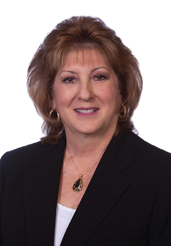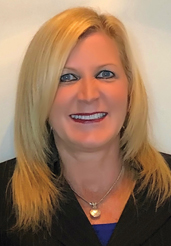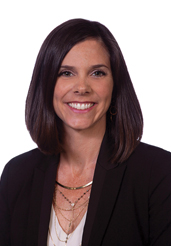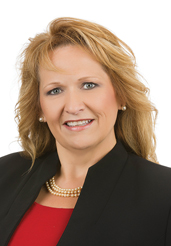
Women of the Industry—Financial Roundtable
Published August 2019
Editor’s Note: The contributions below are from some of the Women of the Industry who appeared in our November 2018 issue. They address several important elements to consider when planning for the financial success of one’s community association.
 Believe, Achieve, and Succeed
Believe, Achieve, and Succeed
By Liz Crapet, CAM
SVP/Sr. Association Banking Relationship Manager
Centennial Bank
I have always favored the words believe, achieve, and succeed. I have included these words and actions in my personal life as well as my professional life. I am here today because I believed I could achieve anything I put my mind to. Success is the end result; however, this is something that each individual interprets differently.
There have been many twists and turns in my career, which has kept it interesting, but I have found hard work, focus, determination, and education are the key elements needed. I have also had the pleasure to work with professionals who have excelled in our industry and who have shared their knowledge to help guide a career. However, you must want to put their wisdom into action. In addition, you must always continue to stay relevant and knowledgeable on any changes within your industry. Believing you can do anything helps you achieve the goals you have set, and success will always follow.
For more information on Centennial Bank, call (941) 237-2003, email lcrapet@my100bank.com, or visit www.my100bank.com.
 One-Hour Board Meeting
One-Hour Board Meeting
By Lisa Elkan
VP/Association Financial Partner for the South Florida region
Alliance Association Bank
Whether you are currently on the board of directors at your homeowners association or plan to be in the future, you recognize that the most important element in the operation of a community association is the meeting. The success of an association is reflected in the quality of its meetings. With a one-hour board meeting, unity is created, and the group moves toward its goal in an expeditious manner. The goal of enhancement and protection of the community’s property value is important and shared by the entire community. The board is in charge of a corporation whose assets may be in the millions of dollars. A board meeting is a gathering of the corporate board to conduct the business of the association. It needs to be effective, efficient, and held to one hour. Each meeting sends its own subliminal supportive communication to the members. Effective board meetings not only lead to financial stability and prosperity, but they will have a ripple effect in the people who live in the community as it begins to run more efficiently. Suddenly, people seem a little happier, things are a little easier to accomplish, and you have changed the financial and social climate of your community.
For more information on Alliance Association Bank, call (561) 212-2091, email lelkan@allianceassociationbank.com, or visit www.allianceassociationbank.com.
 Knowledge—The Key to Financial Success
Knowledge—The Key to Financial Success
By Sheila Lee, CAM, CMCA
Association Banking Relationship Manager
Centennial Bank
We don’t know what we don’t know. In a constantly changing environment of economic circumstances and regulations, knowledge is the key to financial success.
Know your community—Understand the needs of the residents and the limitations stated in the governing documents and bylaws. Survey the community and determine a consensus of the needs and direction of the community.
Know your vendors—Ask other communities and managers for references and recommendations for vendors. Search for reviews and check associations groups, such as CAI, for reputable preferred vendors who have helped other communities become successful in servicing their needs.
Know your budget—Know what you need to budget for. Starting the budget process in advance can present more options to the community, allow for more choices, and allow better comparisons to reach better decisions.
Know your options—Take educational classes and utilize resources to know what is out there that can help you. Get your banker involved to talk about options for financial preparedness.
For more information on Centennial Bank, call (941) 237-2036, email slee@my100bank.com, or visit www.my100bank.com.
 Common Cents
Common Cents
By Melissa L. Nash, President/CEO
ARI–Accounts Receivables Inc.
Assessments come in and expenses go out. As a leader in the industry and a member of my board, I always focus on being proactive rather than reactive. Make sure there is a plan for the following items:
Payments: Create a collection plan and stick with it. Go get a money judgment for non-payment.
Reserves: Do you have enough, and, if not, remember pennies turn into a dollar quickly. Start saving.
Office: Are you properly staffed? Manage the results of each position to maximize efficiency.
Audit: Make sure there is an independent auditor. Follow the money and budget variances.
Counselor: Attorneys keep associations out of trouble. Don’t be emotional, and trust their advice.
Technology: Let it work for you. Don’t be afraid of change. Smart buildings can be a good long-term investment.
Insurance: Trust a great broker. If it sounds too good to be true, it probably is. Do not underinsure.
Volunteers: Usually it’s your board but encourage community participation and promote being neighborly.
Entertainment: Pools, clubhouses, and common areas are primary purchasing decisions for enjoyment and recreation. Consistent and timely routine maintenance can extend the life cycle and reduce repairs.
Making decisions about protecting property values and quality of life for residents—that’s common cents.
For more information on Accounts Receivables Inc. (ARI), call (561) 697-4911 or visit www.4aronline.com.
 Plan Properly for The Association’s Future Expenses
Plan Properly for The Association’s Future Expenses
By Kathleen Naughton, CMCA, AMS
VP/Association Banking Relationship Manager
Centennial Bank
As a former HOA board member and property manager, I have found that properly planning for the future expenses of the association is a critical best practice.
One tool an association can use is a professional reserve study. This study will break out all of the common elements and estimate their expected useful life. This will allow the association board to analyze how they will plan to pay to replace items that are the responsibility of the association and when they should expect these expenses to occur.
The reserve study then becomes a great tool for budgeting. The board can use the study to assist in the decision of whether to include setting aside some of the maintenance funds in a reserve account to accommodate future major expenditures.
Some boards may elect to special assess for future expenses. The reserve study can then be a tool in determining the amount of the special assessment. The association may investigate taking out a loan to cover the upcoming capital expenditures in order to lengthen the special assessment period for the homeowners. The reserve study will also be helpful to have on board for loan application purposes.
For more information on Centennial Bank, call (954) 203-1285, email knaughton@my100bank.com, or visit www.my100bank.com.




